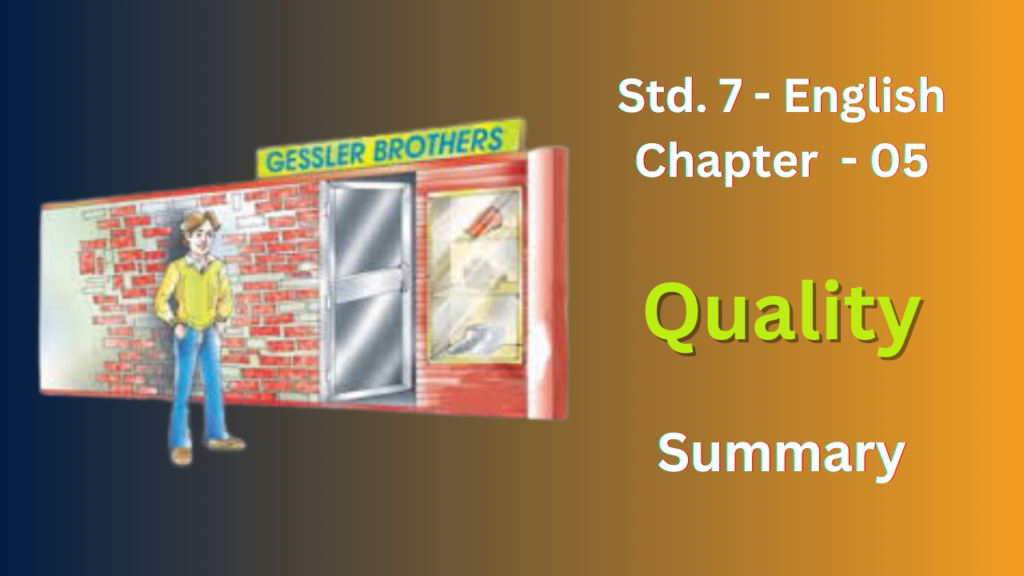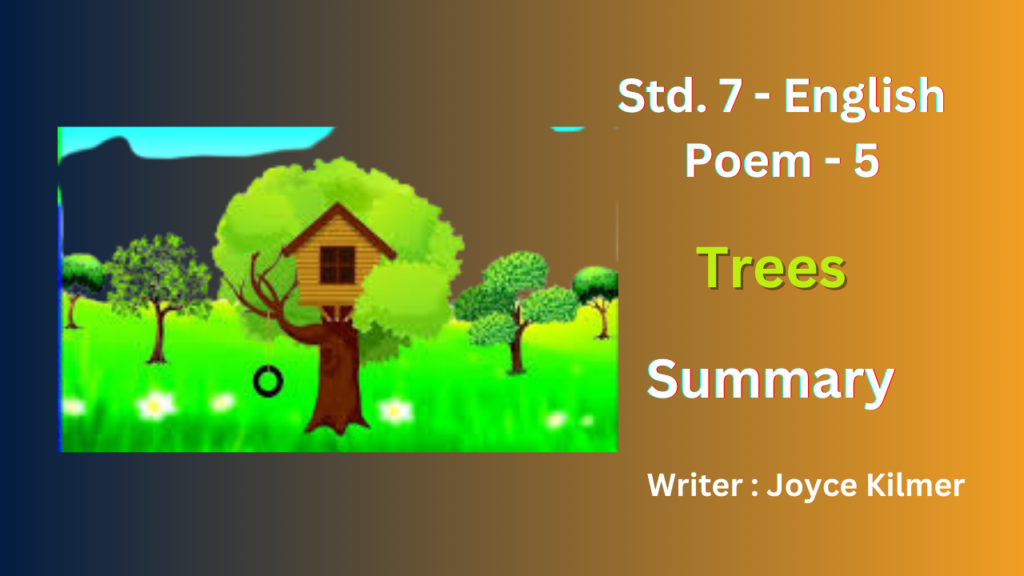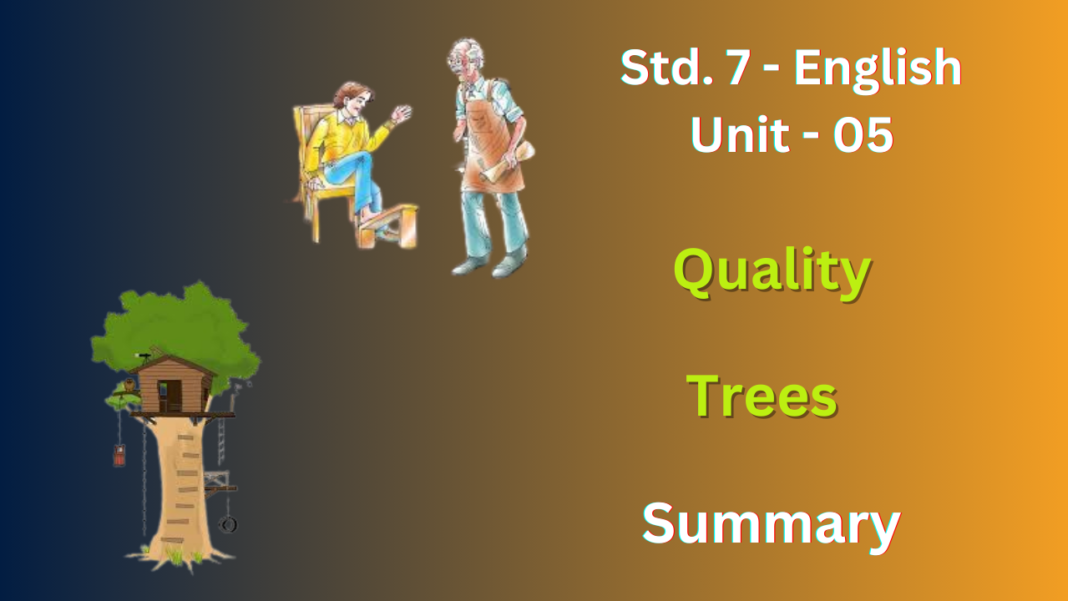NCERT Solutions for Class 7 English Chapter 5
Quality
The chapter “Quality” dives into the world of Mr. Gessler, a German shoemaker renowned for his exceptional craftsmanship. The story, narrated by someone who knew Mr. Gessler since childhood, serves as a testament to the shoemaker’s unwavering dedication to quality and perfect fit.
A Shop Reflecting his Values: Unlike flashy, modern shops brimming with mass-produced footwear, Mr. Gessler’s shop is a stark contrast. It’s described as simple and peaceful, reflecting the values he prioritizes in his work. Here, the focus is on meticulous craftsmanship, not flashy displays.
The Obsession with Perfect Fit: The story delves into Mr. Gessler’s almost obsessive approach to creating boots that fit perfectly. The narrator highlights instances where Mr. Gessler himself questions if it’s “awful” to make such precise footwear. This meticulousness ensures a level of comfort and functionality that transcends mere fashion.
Customer Satisfaction Above All: Even a seemingly minor complaint from the narrator showcases Mr. Gessler’s commitment to his customers. When the narrator points out a discomfort in a newly acquired pair of boots, Mr. Gessler reacts immediately. Not only does he promise to fix the problem, but he even goes as far as offering a full refund if he can’t achieve a perfect fit.
A Keen Eye for Detail: The narrator recounts another visit that further emphasizes Mr. Gessler’s attention to detail. Lost in thought, the narrator enters the shop wearing a pair of boots that are clearly not ideal. Despite the narrator’s obliviousness, Mr. Gessler instantly notices the discomfort caused by a small, seemingly insignificant flaw in the boot’s design. This highlights his exceptional ability to identify and address even the subtlest issues related to fit and functionality.
A Disdain for Mass Production: One interesting aspect of the story involves Mr. Gessler’s disapproval of “big firms” and their advertisements. Here, the author subtly contrasts the world of Mr. Gessler’s quality craftsmanship with the mass production of less durable, trend-driven footwear. This comparison suggests a social commentary on the growing emphasis on quantity over quality in a consumerist society.
Beyond the Boots: A Celebration of Craftsmanship: While the story revolves around boots, “Quality” goes beyond a simple purchase. It celebrates the value of dedication to a craft, the pride one takes in creating something well, and the importance of prioritizing customer satisfaction over profit. Mr. Gessler becomes an embodiment of these values, inspiring admiration and respect for his unwavering commitment to exceptional quality.

Working With Text
Answer the following questions
What was the author’s opinion about Mr Gessler as a bootmaker?
Ans : The author considered Mr. Gessler a top-notch bootmaker. Gessler’s boots were crafted with the finest materials and fit like a dream. The author even saw a bit of magic in Gessler’s skill, resulting in boots that were both beautiful and built to last.
2. Why did the author visit the shop so infrequently?
Ans : The author visited the shop so infrequently because Mr. Gessler’s boots were incredibly durable. The story suggests they lasted a very long time, meaning the author wouldn’t need new ones very often.
3. What was the effect on Mr Gessler of the author’s remark about a certain pair of boots?
Ans : Mr. Gessler’s reaction was a mix of surprise and determination. The creaking boots seemed to challenge his pride in his craft. He initially paused, likely surprised, then offered solutions to fix the issue.
4. What was Mr Gessler’s complaint against ‘big farms’?
Ans : Mr. Gessler believed big firms prioritized flashy advertising over quality work. He felt they tricked customers into buying with marketing instead of relying on the actual quality of their products. This unfair competition hurt his business, a smaller operation focused on genuine craftsmanship.
5. Why did the author order so many pairs of boots? Did he really need them?
Ans : The author ordered so many pairs of boots even though he didn’t necessarily need them because he wanted to help Mr. Gessler. The author likely recognized Mr. Gessler’s struggle due to big firms dominating the market, and by ordering extra boots, he aimed to provide Mr. Gessler with some financial security.
Working With Language
Study the following phrases and their
meanings. Use them appropriately to complete
the sentences that follow.
look after : take care of
look down : disapprove or regard as
on inferior
look in : make a short visit
(on someone)
look into : investigate
look out : be careful
look up : improve
look up to : admire
- After a very long spell of heat, the weather is ………….. at last.
- We have no right to …………. people who do small jobs.
- Nitin has always ……………. his uncle, who is a self-made man.
- The police are …………… the matter thoroughly.
- If you want to go out, I will ………….. the children for you.
- I promise to ………….. on your brother when I visit Lucknow next.
- ……………. when you are crossing the main road.
Ans :
- After a very long spell of heat, the weather is finally looking up at last.
- We have no right to look down on people who do small jobs.
- Nitin has always looked up to his uncle, who is a self-made man.
- The police are looking into the matter thoroughly.
- If you want to go out, I will look after the children for you.
- I promise to look in on your brother when I visit Lucknow next.
- Look out! be careful when you are crossing the main road.
3. Each of the following words contains the sound ‘sh’ (as in shine) in the beginning or in the middle or at the end. First speak out all the words clearly. Then arrange the words in three
groups in the table.
sheep trash marsh fashion
anxious shriek shore fish
portion ashes sure nation
shoe pushing polish moustache
Ans :
| Initial | Medial | Final |
| Sheep | Fashion | Trash |
| Shriek | anxious | Marsh |
| Shore | Portion | Fish |
| Sure | Ashes | Polish |
| shoe | Nation | |
| Pushing | ||
| Moustache |
Speaking
1. Do you think Mr Gessler was a failure as a bootmaker or as a competitive businessman?
Ans : Mr. Gessler was definitely not a failure as a bootmaker. The story highlights his exceptional skills:
- Unmatched Quality: He used the finest materials and produced incredibly durable boots.
- Perfect Fit: He ensured a perfect fit for each customer through custom measurements.
However, Mr. Gessler might be considered a failure as a competitive businessman. Here’s why:
- Focus on Quality over Marketing: He prioritized creating the best possible boots rather than flashy advertising.
- Limited Clientele: He likely had a smaller customer base due to the lack of marketing.
- Vulnerable to Big Firms: Big companies with mass production and marketing muscle could undercut his prices.
2. What is the significance of the title? To who or to what does it refer?
Ans : The title, “The Bootmaker,” has a two-fold significance:
- Refers to Mr. Gessler: On the most basic level, it directly refers to Mr. Gessler’s profession. He is, after all, the skilled craftsman who makes boots.
- Represents Dedication to Craft: The title goes beyond just identifying Mr. Gessler’s job. It signifies the story’s focus on his dedication to his craft. He isn’t just making boots; he’s creating high-quality footwear with exceptional skill and care. The title reflects the respect the author holds for Mr. Gessler’s mastery.
3.
- Notice the way Mr Gessler speaks English. His
English is influenced by his mother tongue. He speaks English with an accent. - When Mr Gessler speaks, p, t, k, sound like b,d,g. Can you say these words as Mr Gessler would say them?
It comes and never stops. Does it bother me? Not at all. Ask my brother, please.
Ans : 1. The passage describes Mr. Gessler’s English as influenced by his native language, resulting in an accent. Specifically, it mentions that the consonant sounds /p/, /t/, and /k/ are pronounced as /b/, /d/, and /g/ respectively in his speech.
2. Id gomes und never sdops. Does id bodder me? Nod ad all. Ask my brudder, blease.
Writing
Based on the following points write a story.
- Your aunt has gone to her mother’s house.
- Your uncle does his cooking.
- He is absent-minded.
- He puts vegetables on stove.
- He begins to clean his bicycle outside.
- The neighbour calls out saying something is burning.
- Your uncle rushes to the kitchen.
- To save vegetables, he puts some oil in them.
- Unfortunately, it’s machine oil, not cooking oil.
- What do you think happens to the vegetables?
Ans :
The redwood canopy swallowed the last traces of sunlight, casting long, skeletal shadows across the forest floor. Ethan, his breath ragged and shallow, pushed through the undergrowth, frustration gnawing at him. He’d been following a faded map, a hand-me-down from a forgetful uncle, promising a hidden waterfall. Now, hours later, his legs throbbed with each step, his canteen was a cruel reminder of his thirst, and the map resembled a child’s scribble more than a reliable guide.
Panic, a cold serpent, coiled in his stomach. He was hopelessly lost. Just as despair threatened to consume him, a flicker of light, a silver thread in the tapestry of green, caught his eye. Hope surged through him like a jolt. Smoke. Smoke meant people, and people meant help.
He pushed through the dense foliage, following the wispy trail until he emerged into a clearing bathed in the golden glow of the setting sun. Nestled in the heart of it stood a small cabin, its moss-covered roof almost blending into the surrounding ferns. A plume of wood smoke, a comforting symbol of life in the vast wilderness, curled lazily from its chimney.
Ethan approached cautiously, his heart hammering a frantic rhythm against his ribs. With a trembling hand, he knocked on the weathered door. It creaked open to reveal a woman with gentle eyes the color of twilight and hair the shade of spun moonlight. Her smile, warm and genuine, dispelled the remaining tendrils of fear clinging to him.
“Lost, are you, child?” Her voice was a soothing melody, a balm to his frayed nerves. Ethan could only nod, his throat too parched for speech.
She ushered him inside, the cabin a haven of warmth and comfort. A crackling fire in the hearth cast flickering shadows on the walls. The aroma of woodsmoke mingled with the heavenly scent of baking bread, making his stomach rumble in protest.
A steaming mug materialized in his hands. He took a tentative sip, and the chamomile tea, infused with Elara’s kindness, sent a wave of warmth through him. It was the most delicious thing he’d ever tasted – a simple pleasure magnified by his ordeal.
Over mugs of tea and warm bread, Ethan recounted his tale. Elara listened patiently, her lips curving into a knowing smile when he mentioned the dubious map.
“Sometimes, young one,” she said, her voice laced with experience, “the greatest treasures are found when we’re lost.”
As the night deepened and the fire crackled a lullaby, Elara showed him to a cozy room upstairs. Moonlight streamed through the window, bathing the room in an ethereal glow. A patchwork quilt, sewn with love and countless stories, awaited him on a simple bed.
Morning arrived too soon, heralded by the chirping of birds and the tantalizing aroma of frying bacon. Ethan found Elara by the window, a soft smile gracing her lips.
“There’s a path just south of here,” she said, pointing towards the woods. “It leads back to the main trail.”
She pressed a small, worn leather pouch into his hand. Inside, nestled among a few coins, was a new map, its lines crisp and clear. On it, a small red X marked the location of the hidden waterfall.
“Sometimes,” she said, her eyes holding his gaze, “getting lost is the only way to find what you truly seek.”
With a heart overflowing with gratitude, Ethan bid farewell to Elara. He followed the path, the map tucked safely in his pocket. He would never forget his experience in the redwoods, the kindness of a stranger, and the valuable lesson learned – sometimes, getting lost is the only way to find yourself, and maybe, just maybe, a hidden waterfall or two. But more importantly, he had found something even more valuable – the warmth of human connection in the heart of a vast wilderness.
Trees
The poem “Trees” celebrates the many benefits and joys that trees bring to our lives. Here’s a summary:
- Trees provide shade and shelter: The poem highlights how trees offer a cool refuge on hot days and a shield from harsh weather.
- Trees offer a place for play: They become climbing frames for children and a place to build forts and swing on swings.
- Trees provide fruit and beauty: Some trees offer delicious fruits to enjoy, while others simply add beauty to the landscape with their leaves and flowers.
- Trees inspire creativity: The poem suggests that trees can spark imaginative play and artistic inspiration.
- Trees are a source of peace and relaxation: Sitting under a tree can offer a calming and relaxing experience.
Overall, the poem paints a picture of trees as essential elements in our environment, enriching our lives in various ways.

Working With Poem
1. What are the games or human activities which use trees, or in which trees also “participate’?
Ans :Trees play a fun role in many activities! Kids use them for hide-and-seek, climbing, and building forts. Swings hang from sturdy branches, and picnics often take place under their cool shade. They’re more than just scenery – they’re silent participants in our outdoor fun!
2.
- “Trees are to make no shade in winter.” What does this mean? (Contrast this line with the line immediately before it.)
- “Trees are for apples to grow on, or pears.” Do you agree that one purpose of a tree is to have fruit on it?
(Or) Do you think this line is humorous?
Ans :
1. Summer Shade, Winter Sun: Lush trees offer cool shade during scorching summers, a welcome relief. But come winter, the sun’s warmth becomes desirable, and people bask in the open sky.
2. Fruitful Purpose: Trees serve another essential purpose: providing fruits like apples and pears. They are a vital source of food for humans.
3. With the help of your partner, try to rewrite some lines in the poem, or add new ones of your own as in the following examples.
Trees are for birds to build nests in.
Trees are for people to sit under.
Now try to compose a similar poem about Water, or air.
Ans : Air, the Unseen Friend
Air, a breath we take for granted,
A silent gift, so often slanted.
Invisible swirls, a constant tide,
Carrying whispers, secrets it can’t hide.
Air, the playground for clouds to roam,
From cotton puffs to thunder’s dome.
It lifts the kite, a joyous flight,
And carries laughter, day and night.
Air, a lifeblood, unseen but known,
In every lung, a precious loan.
From rustling leaves to crashing waves,
It dances, sings, in nature’s braves.
Air, a canvas vast and wide,
For windblown seeds, on journeys they ride.
A sculptor’s touch on dunes of sand,
A gentle breeze across the land.
So breathe it deep, this gift so free,
Air, the unseen friend, for you and me.
FAQ’s
What topics are covered in NCERT Solutions for Class 7 English unit 5?
Chapter 5 of Class 7 English covers two topics: “Quality” and “Trees.
How do NCERT Solutions for Class 7 English Chapter 5 help in understanding these topics?
These solutions provide comprehensive explanations, analyses, and interpretations of each topic, aiding students in grasping the themes, concepts, and literary elements presented in the text.
What is the story “Quality” about?
“Quality” is a short story that explores the concept of craftsmanship and the pursuit of excellence. It delves into themes of dedication, integrity, and the value of high-quality workmanship.
What is the significance of “Trees” in this chapter?
The chapter may include a poem or prose passage that celebrates the beauty, importance, and symbolism of trees in nature. It may explore themes such as environmental conservation, biodiversity, and the interconnectedness of life.
How can students relate to the themes of “Quality” and “Trees” in their own lives?
Students can reflect on the importance of striving for excellence in their studies, hobbies, and personal endeavors, inspired by the dedication of craftsmen depicted in “Quality.” Additionally, they can appreciate the beauty and significance of trees in their local environment and consider the role they play in preserving nature.









